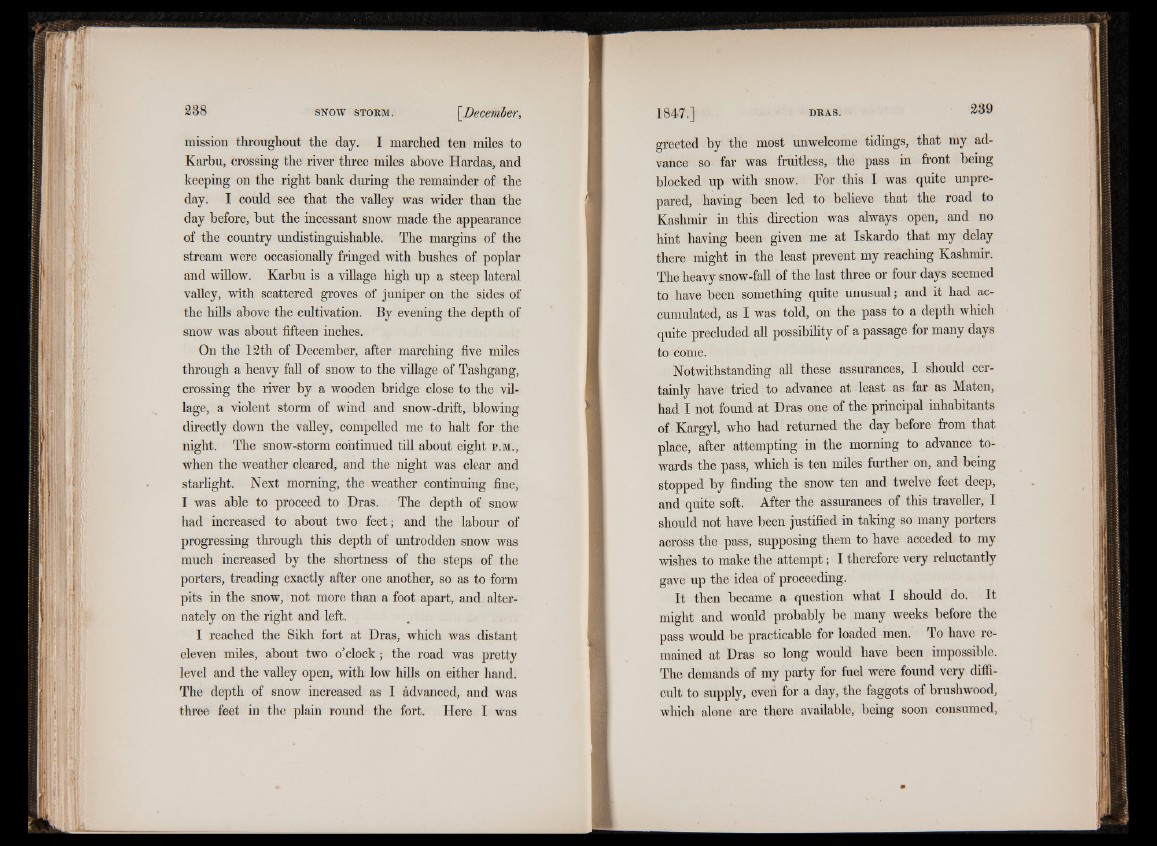
mission throughout the day. I marched ten miles to
Karbu, crossing the river three miles above Hardas, and
keeping on the right bank during the remainder of the
day. I could see that the valley was wider than the
day before, but the incessant snow made the appearance
of the country undistinguishable. The margins of the
stream were occasionally fringed with bushes of poplar
and willow. Karbu is a village high up a steep lateral
valley, with scattered groves of juniper on the sides of
the hills above the cultivation. By evening the depth of
snow was about fifteen inches.
On the 12th of December, after marching five miles
through a heavy fall of snow to the village of Tashgang,
crossing the river by a wooden bridge close to the village,
a violent storm of wind and snow-drift, blowing
directly down the valley, compelled me to halt for the
night. The snow-storm continued till about eight p .m.,
when the weather cleared, and the night was clear and
starlight. Next morning, the weather continuing fine,
I was able to proceed to Dras. The depth of snow
had increased to about two feet; and the labour of
progressing through this depth of untrodden snow was
much increased by the shortness of the steps of the
porters, treading exactly after one another, so as to form
pits in the snow, not more than a foot apart, and alternately
on the right and left.
I reached the Sikh fort at Dras, which was distant
eleven miles, about two o’clock; the road was pretty
level and the valley open, with low hills on either hand.
The depth of snow increased as I advanced, and was
three feet in the plain round the fort. Here I was
greeted by the most unwelcome tidings, that my advance
so far was fruitless, the pass in front being
blocked up with snow. For this I was quite unprepared,
having been led to believe that the road to
Kashmir in this direction was always open, and no
hint having been given me at Iskardo that my delay
there might in the least prevent my reaching Kashmir.
The heavy snow-fall of the last three or four days seemed
to have been something quite unusual; and it had accumulated,
as I was told, on the pass to a depth which
quite precluded all possibility of a passage for many days
to come.
Notwithstanding all these assurances, I should certainly
have tried to advance at least as far as Maten,
had I not found at Dras one of the principal inhabitants
of Kargyl, who had returned the day before from that
place, after attempting in the morning to advance towards
the pass, which is ten miles further on, and being
stopped by finding the snow ten and twelve feet deep,
and quite soft. After the assurances of this traveller, I
should not have been justified in taking so many porters
across the pass, supposing them to have acceded to my
wishes to make the attempt; I therefore very reluctantly
gave up the idea of proceeding.
It then became a question what I should do. It
might and would probably be many weeks before the
pass would be practicable for loaded men. To have remained
at Dras so long would have been impossible.
The demands of my party for fuel were found very difficult
to supply, even for a day, the faggots of brushwood,
which alone are there available, being soon consumed,